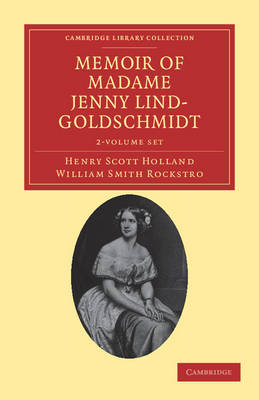Cambridge Library Collection - Music
2 primary works • 5 total works
Volume 1
Memoir of Madame Jenny Lind-Goldschmidt: Volume 1
by Henry Scott Holland and William Smith Rockstro
Published 4 March 2010
Jenny Lind (1820-87) was one of Europe's most famous opera singers. Known as the 'Swedish Nightingale', she first rose to prominence in an 1838 performance of Weber's Freischutz. Despite her immense success over the next ten years, she retired from the stage at the age of twenty-nine. Seeking financial security to pursue her charitable interests, in 1850 she accepted the invitation of impresario P. T. Barnum to undertake a tour of the United States; this was another succession of triumphs. Henry Scott Holland (1847-1918), the theologian and social reformer, and music writer William Smith Rockstro (1823-95) used Lind's own documents, letters and diaries as the basis of this two-volume memoir, published in 1891, which focuses on the first thirty-one years of her life. Volume 1 covers Lind's Swedish childhood and early singing career, and a brief but critical period when she suffered damage to her vocal cords.
Volume 2
Memoir of Madame Jenny Lind-Goldschmidt: Volume 2
by Henry Scott Holland and William Smith Rockstro
Published 5 January 2010
Jenny Lind (1820-87) was one of Europe's most famous opera singers. Known as the 'Swedish Nightingale', she first rose to prominence in an 1838 performance of Weber's Freischutz. Despite her immense success over the next ten years, she retired from the stage at the age of twenty-nine. Seeking financial security to pursue her charitable interests, in 1850 she accepted the invitation of impresario P. T. Barnum to undertake a tour of the United States; this was another succession of triumphs. Henry Scott Holland (1847-1918), the theologian and social reformer, and music writer William Smith Rockstro (1823-95) used Lind's own documents, letters and diaries as the basis of this two-volume memoir, published in 1891, which focuses on the first thirty-one years of her life. Volume 2 discusses some of Lind's most memorable performances in Europe and the reasons for her first retirement; it ends with her departure for America.
A friend and pupil of Mendelssohn, the composer and author William Smith Rockstro (1823-95) was regarded as an expert on early music. He contributed articles on the subject to Sir George Grove's Dictionary of Music and Musicians as well as teaching counterpoint and plainsong at the Royal College of Music. His published output includes biographies of Handel (1883), Mendelssohn (1884) and the opera singer Jenny Lind (1891), all of which are reissued in this series. The present work was first published in 1886. In its narrative of musical history since the Greeks, it gives due weight to the development of music in England and includes, naturally, a chapter on Handel that reflects his enduring influence on national taste. The final section of the book discusses the contemporary musical scene and considers the importance of the recently deceased Wagner for the music of the future.
Beloved not only in Britain, George Frideric Handel (1685-1759) is admired as a composer the world over. His inventive and sensitive melodic genius and his exuberant brilliance in depicting the spectacular are best displayed in his Messiah and Zadok the Priest. Larger than life, Handel impressed all who met him and was adept at promoting his works, arranging for their publication and even selling them from his home in London's Brook Street. His dogged determination to triumph over the many reverses of his career and the fickle enthusiasms of the Georgian public is the stuff of three-volume novels. This sympathetic and highly readable biography by the composer and author William Smith Rockstro (1823-95) was first published in 1883. Wherever possible, autograph manuscripts have been consulted and the book contains the first detailed catalogue of Handel's output. Among other works, Rockstro's biography of Mendelssohn is also reissued in this series.
Memoir of Madame Jenny Lind-Goldschmidt 2 Volume Set
by Henry Scott Holland and William Smith Rockstro
Published 20 October 2011
Jenny Lind (1820-87) was one of Europe's most famous opera singers. Known as the 'Swedish Nightingale', she first rose to prominence in an 1838 performance of Weber's Freischutz. Despite her immense success over the next ten years, she retired from the stage at the age of twenty-nine. Seeking financial security to pursue her charitable interests, in 1850 she accepted the invitation of impresario P. T. Barnum to undertake a tour of the United States; this was another succession of triumphs. Henry Scott Holland (1847-1918), the theologian and social reformer, and music writer William Smith Rockstro (1823-95) used Lind's own documents, letters and diaries as the basis of this two-volume memoir, published in 1891, which focuses on the first thirty-one years of her life. Volume 1 covers Lind's Swedish childhood and early singing career. Volume 2 discusses her most memorable performances in Europe and the reasons for her retirement.

